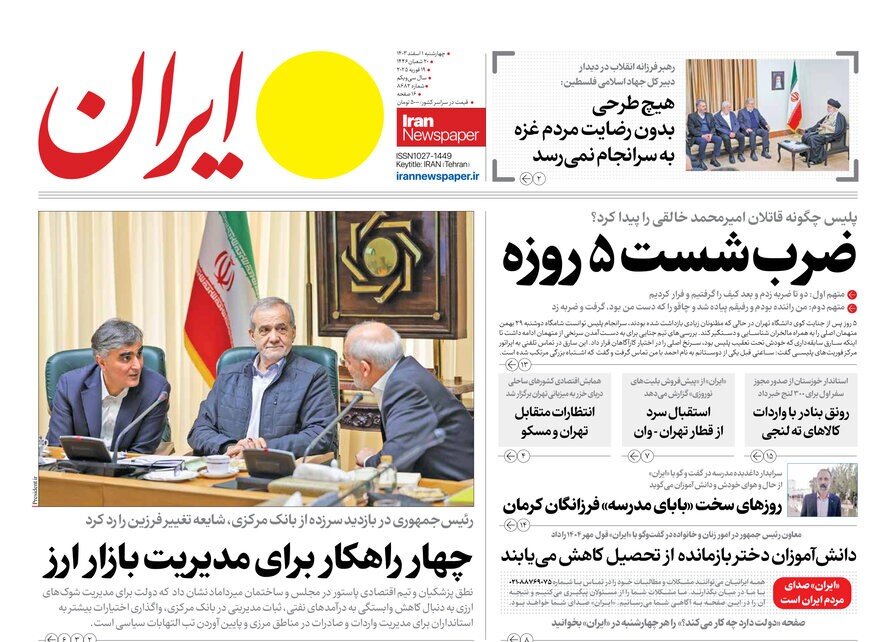Irans path passes through the sea
Iran's path passes through the sea
TEHRAN - In a commentary, the Iran newspaper discussed the two-day Caspian Economic Forum meeting hosted by Tehran, attended by officials from the five Caspian littoral countries.

The paper stated that the event not only highlighted the Caspian Sea's role as a cooperation area but also positioned the conference as a potential permanent institution for promoting regional economic cooperation. Iran views the Caspian Sea coasts as gateways to the global economy, which can be leveraged to develop ports, maritime transport, and a regional supply chain. Iran's access to the Persian Gulf, the Sea of Oman, and the Caspian Sea provides unique transit capabilities. By creating an attractive North-South international transport corridor and establishing a transit link between the Sea of Oman and the Caspian Sea, Tehran can become a regional corridor hub. This also lays the foundation for a robust communication network facilitating the exchange of goods between countries from the Indian Ocean to the Baltic and Scandinavian regions.
Ham Mihan: Moscow-Tehran rapprochement
In an article, Ham Mihan addressed the recent agreement between Iran and Russia, stating that it establishes a framework for bilateral cooperation over the next two decades. It wrote: According to published reports, the agreement's military component encompasses strategic consultations on shared security concerns, joint military exercises, and collaborative efforts within the defense industry. The signing of this document has fueled the narrative of a burgeoning coalition aimed at challenging the United States. The strengthening of ties between Iran and Russia gained momentum with the onset of the Syrian civil war, during which Russian and Iranian actors coordinated their operations and solidified their influence in Damascus. However, this agreement underscores that the rapprochement between Russia and Iran extends beyond a relationship solely defined by the conflicts in Syria and Ukraine. It signals a concrete commitment from both nations to synchronize their security policies. Reinforcing this point, Iranian Foreign Minister Abbas Araghchi characterized the treaty as "not just a political agreement" but as "a roadmap for the future."
Sobh-e-No: opposition becomes dead wood
In a statement, Sobh-e-No highlighted the anti-Iran groups’ persistent failures, stating: "The opposition's disgraces seem endless. Yet, some bankrupt figures persist in their adventurism and fantasies." The statement continued, pointing out the diminishing support for Reza Pahlavi in Europe: "Despite the hostile positions and ongoing antagonism from some European nations towards the Islamic Republic of Iran, recent events indicate a growing disillusionment. The Germans did not welcome Reza Pahlavi at the Munich Conference, the Dutch parliament canceled a joint meeting with him, and even the British refused to grant him an audience. The reality is that these spent forces within the opposition have lost their appeal, even to European countries." Sobh-e-No further commented on the reaction to these setbacks: "The uproar on several Western-based Persian-language television channels, the anger of the few remaining monarchist supporters, and the group's harsh criticism of European countries demonstrate that the hopes of the remnants of the Pahlavi regime about a renewed Western project have likely vanished. Ultimately, the fate of these saboteurs and opposition figures has become clear, even to the Islamic Republic of Iran's foreign adversaries.
Arman-e-Emrooz: the ambiguous future of Iran and U.S.
Arman-e-Emrooz talked about the potential future of Iran-US engagements. It seems Trump is gradually and progressively increasing his pressure and trying to close the routes for Iran's oil exports with China. In the meantime, it is unlikely that the Iranian-European dialogue will have a specific result because Europe and the United States do not have any particular differences about Iran. It is most likely that Tehran will try to prevent the activation of the trigger mechanism by giving concessions to the European parties and even the Agency in bilateral talks. But there is no guarantee that at least one of these parties will not do this before October 18, 2025. Trump currently wants to increase political and economic pressure and even threaten war and attack to achieve the desired result, and we should see to what extent Iran's internal situation can tolerate these very difficult economic conditions. Therefore, because of the continuation and intensification of sanctions and pressure, internal politics may be the most important challenge facing the government in the future. Overall, it is unlikely that there will be a breakthrough in the relationship between the United States and Iran in the first two years of Trump's presidency. If negotiations and an agreement are reached, it will likely be in the second two years.
source: tehrantimes.com